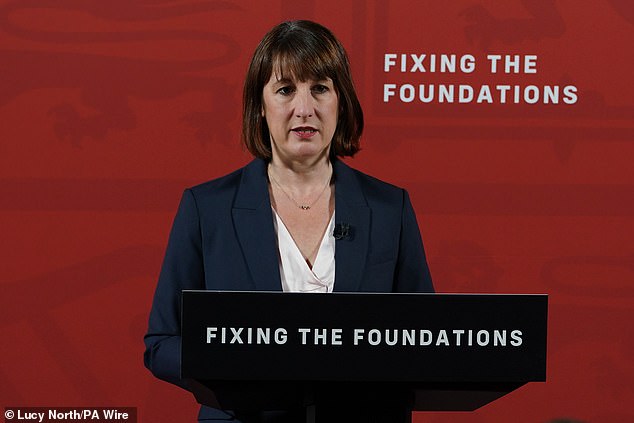Table of Contents
Britain’s biggest banks could be hit by a one-off tax that could allow them to raise up to £14bn, as Labour struggles to fill a so-called £22bn “black hole” in the UK’s finances.
Lenders could be in the firing line ahead of Rachel Reeves’ Budget on October 30 after their profits soared last year due to high interest rates.
A 35 per cent levy on the £44.3bn of pre-tax profits reported by HSBC, Barclays, Lloyds and NatWest in 2023 would raise £14bn, according to research by campaign group Positive Money.
Last year’s profits were more than four times higher than in 2020 before interest rates began to rise, the analysis showed.
Tax rises: UK lenders may be in the firing line ahead of Rachel Reeves’ Budget on October 30 after their profits soared last year due to high interest rates
A survey by the think tank last year found that most Britons would support a higher tax on bank profits at a time when households are struggling.
Shares in the UK’s major banks fell this week after the Prime Minister warned that the budget will be “painful”. Sir Keir Starmer said on Tuesday that “those with the broadest shoulders should bear the heaviest burden”.
Chancellor Reeves says the Conservative government has left a £22bn “black hole” in the public finances, while paving the way for tax rises.
Banks are seen as easy targets after higher interest rates allowed them to make bumper profits last year amid the cost of living crisis.
A similar tax was introduced for energy companies after their profits soared when gas prices rose following Russia’s invasion of Ukraine.
Oil and gas giants are required to pay a 35 per cent surcharge on profits, and Labour is expected to push for a further increase in the tax.
Simon Youel, director of policy and advocacy at Positive Money, said: “There is nothing radical about a windfall tax – even Thatcher understood that banks can and should bear the burden of fairer taxation when they have benefited from higher rates.”
Dan Coatsworth, analyst at AJ Bell, said: “No one will shed tears if banks are forced to hand over a larger proportion of their profits.”
But similar taxes have not been successful in other countries. Last year, Italy watered down a 40% tax and in March admitted it had raised no revenue from the policy.
In the UK, lenders pay a tax on liabilities and equity, a policy introduced after the financial crisis. Banks also pay corporation tax and a surcharge (a tax on profits).
The Conservatives cut the surcharge from 8 percent to 3 percent in April last year to offset a rise in corporation tax from 19 percent to 25 percent.
DIY INVESTMENT PLATFORMS

AJ Bell

AJ Bell
Easy investment and ready-to-use portfolios

Hargreaves Lansdown

Hargreaves Lansdown
Free investment ideas and fund trading

interactive investor

interactive investor
Flat rate investing from £4.99 per month

Saxo

Saxo
Get £200 back in trading commissions

Trade 212

Trade 212
Free treatment and no commissions per account
Affiliate links: If you purchase a product This is Money may earn a commission. These offers are chosen by our editorial team as we believe they are worth highlighting. This does not affect our editorial independence.

